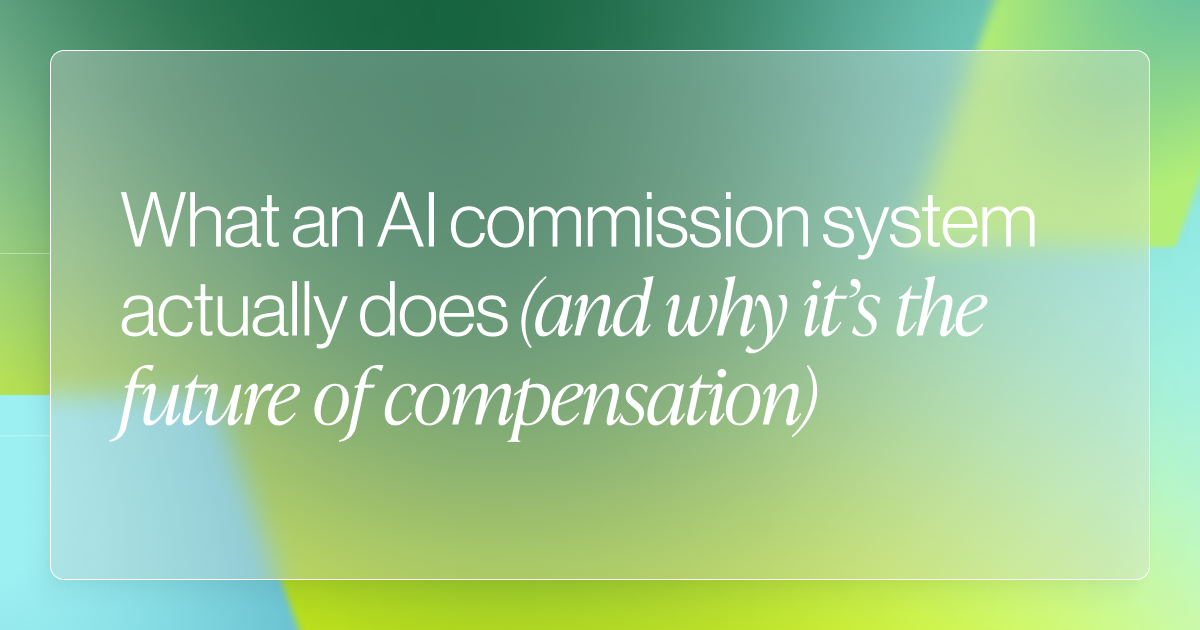Is Your Sales Compensation Future-Proof?
Sales compensation is in a constant state of flux because of the fluidity of the sales environment. A network of sales roles, coverage models, and customer/partner landscape all need to be considered when evaluating the right formula to motivate your frontline team. In 2020, revenue leaders are more determined than ever to keep pace with that fluidity.
So, how do we get better at creating scalable sales compensation systems? We (virtually) sat down with John Weeks, Senior Manager of Sales Planning at Qumulo to get his thoughts on how to better manage sales compensation plans and what he looks for in a commissions management platform. John has spent the majority of his career in sales strategy and compensation-technology related roles at Microsoft and IBM as well as being a sales effectiveness consultant, designing sales compensation plans for enterprise clients and implementing incentive compensation management solutions. As an architect of sales compensation plans, he has a deep understanding of the complexity of sales commissions plans and the significant impact that these plans can have on business outcomes.
How Commissions Strategy Will Change Over Time
Like many business leaders, John’s number one desire is to be able to leverage a platform that allows him to focus on the core of his job — solving high-level business problems and focusing on the growth and development of his team. Thus, his dream state is to use a software that, “takes a system that inherently lacks structure and turns it into a scalable, predictable process” and “has enough flexibility around plan designs, crediting rules, market segmentations, to allow us to run our business the way we need to without being hamstrung by the software that we use.”
John anticipates and hopes that commissions management platforms of the future will be highly integrated with strategic planning and analytics functions. Imagine that your business has decided to redraw its market segmentation lines, redefine its target customers, introduce new use cases for its products and services, etc. A well-designed incentive management solution needs to be able to take these input variables and provide ideal compensation plans and incentive structures to give you a clear picture of how to hit your sales targets. And software platforms in the future will embrace and empower this required flexibility in more scalable ways.
He also believes that our days of mapping sales reps to territories simply for the purpose of calculating commissions payouts based without significant data analysis to inform such changes is antiquated. In a world where big data rules, he believes that software should have the ability to leverage historical data in order to predict financial impact based on various parameters and enable businesses to more effectively assign sales rep conditions. For example, rather than assigning Sam the Sales Rep to zip codes 00123, 00122, and 00121, a business will assign Sam the Sales Rep to specific product combinations and client types based on what historical data can tell us about Sam and the markets he serves, those specific product combinations and those specific client types.
With CaptivateIQ, John wants to spend less of his time managing the underlying architecture of inflexible platforms and more of his time running analytics to gain insights about the business. His goal is to ensure that his recommended compensation plans are allowing the business to achieve its highest potential. He notes that this would not be possible if he were working with software that had severe underlying shortcomings.
With our aggressive growth and pace of change, if we were still working in Excel right now, we would be dead. Absolutely dead.
Adapting for Better Comp in the COVID Environment
In light of the pandemic and changing dynamics for sales teams, John notes that having a powerful, flexible sales commissions software is more important than ever. Companies need to shift from selling through personal relationships to finding more innovative ways to connect with customers. They must be more tightly aligned with marketing organizations, honing key messaging, and embracing channel relationships in a more dynamic way. Given the rapidly changing parameters, it is absolutely necessary to have a sales commissions platform that can be flexible, intake new parameters, and give business leaders better insight into the impact on their sales performance and bottom line.
It can no longer be about just automating the status quo. It needs to inform the future.
The leadership team at CaptivateIQ set out to do exactly that. Tired of the status quo, they decided to create a software that was powerful and flexible enough to provide real business insight tied to sales compensation planning. Our goal is to continue to innovate alongside partners and customers like John in order to empower businesses to reach their fullest potential in the face of a rapidly changing and unpredictable world.
Curious to learn more about CaptivateIQ? Request a demo.
.svg)


.png)





